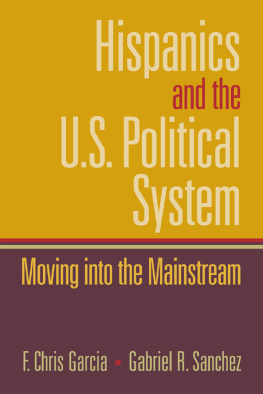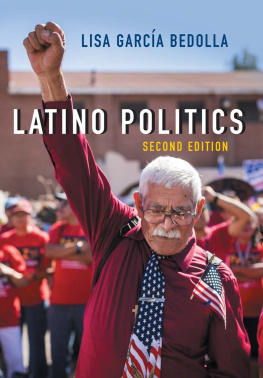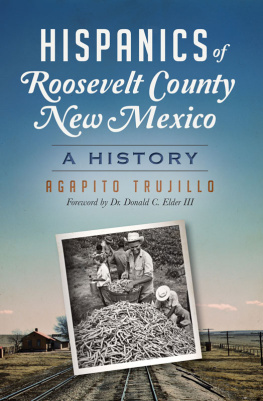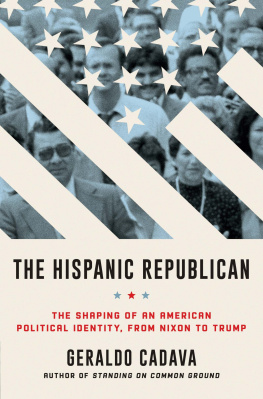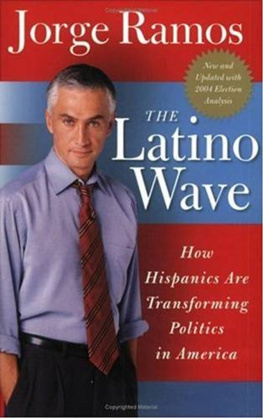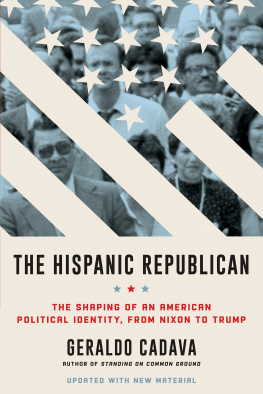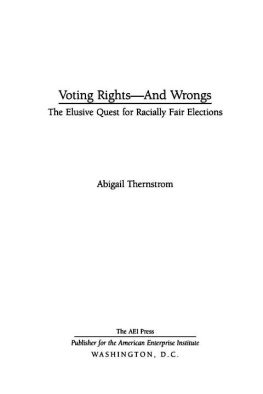Hispanics and the U.S.
Political System
First published 2008 by Pearson Education, Inc.
Published 2016 by Routledge
2 Park Square, Milton Park, Abingdon, Oxon OX14 4RN
711 Third Avenue, New York, NY 10017, USA
Routledge is an imprint of the Taylor & Francis Group, an informa business
Copyright 2008 Taylor & Francis. All rights reserved.
All rights reserved. No part of this book may be reprinted or reproduced or utilised in any form or by any electronic, mechanical, or other means, now known or hereafter invented, including photocopying and recording, or in any information storage or retri eval system, without permission in writing from the publishers.
Notice:
Product or corporate names may be trademarks or registered trademarks, and are used only for identification and explanation without intent to infringe.
Credits and acknowledgments borrowed from other sources and reproduced, with permission, in this textbook appear on appropriate page within text.
ISBN: 9780130615008 (pbk)
Library of Congress Cataloging-in-Publication Data
Garcia, F. Chris.
Hispanics and the U.S. political system : moving into the mainstream / F. Chris Garcia, Gabriel R. Sanchez.
p. cm.
Includes bibliographical references and index.
ISBN-13: 978-0-13-061500-8
ISBN-10: 0-13-061500-5
1. Hispanic AmericansPolitics and government. 2. Hispanic AmericansCultural assimilation. 3. Political participationUnited States. 4. United StatesEthnic relationsPolitical aspects. I. Sanchez, Gabriel R. II. Title.
E184.S75G366 2007
323.1168073dc22
2007019147
Its Hip To Be Hispanic!so headlined an article in a U.S. newspaper at the turn of the twentieth century. Many other similar media pronouncements were commonplace in the late 1990s and early 2000s. Time and Newsweek magazines both devoted cover stories to Hispanics and Latinos. The July 12, 1999 issue of Newsweek featured an article that proclaimed that Hispanics Are Hip, Hot and Making History. Indeed, it was difficult to read any printed news sourcemagazine or newspaperin the late twentieth century and not come across articles on what seemed to be a newly newsworthy ethnic group in the United States. Reportedly, this extensive recognition was brought about by the demographic changes that had been occurring in the 1980s and 1990s but that for various reasons were now coming to a head. One reason was obviousthe decennial U.S. Census of the year 2000 and the preparation for it. The Census pointed out that the Hispanic population was growing so fast that it could no longer be ignored in American society. In fact, some observers began to speak of the browning of America, or its Latinization or Hispanization. This population surge would likely mean some significant changes were coming to the United States in many areas of lifecultural, social, economic, educational, and political.
The political implications of this change in the ethnic composition of the American polity did not go unnoticed by politicians and public officials. It was evident that some major changes in the electorate and in their constituencies were in the wind, and they began to react accordingly.
This was most evident in the period leading up to the general elections of 2000. Early in the campaign, candidates and political party officials began to indicate that Hispanics were being perceived as major players in the campaigns. They were to become major demographic target blocs. In fact, some spokespersons labeled Hispanics as the most critical demographic segment in the presidential electiona battleground groupthe soccer moms of the 2000 election. Latino spokespersons joined in, some even proclaiming that whoever wins the Hispanic vote wins the presidency in 2000.
So, at the turn of the twentieth century, Hispanics had been proclaimed not only as the demographic group to watch as far as social and cultural changes but also as the most critical political players in the nations elections.
As it turned out, however, for a variety of reasons, Hispanics did not play a critical role in determining the outcome of the 2000 election. However, this period seems to have marked the beginning of a new era of accelerated political awareness and participation by Hispanics in politics. The widely publicized demographic changes, with their cultural, social, and economic implications, also spilled over into the political arena. Participation by the Hispanic public increased markedly. They were running for, and sometimes winning, offices in state and local races at an unprecedented rate and in places where they had not previously been noticeably involved.
No longer would Hispanics be labeled the invisible minority, and many of the old, somewhat negatively tinged references to the sleeping giant would at least have to recognize this awakening. Some Latino spokespersons were so delighted with this new recognition that they began to term the 2000s as the century of the Hispanic. A few exuberantly proclaimed this era to be the millennium of the Hispanic!
One need not go that far to realize that there is major change occurring in the United States that reflects the increased numbers, visibility, and influence of Hispanics. This dramatic increase in the Hispanic population, as well as the dispersal of Hispanics into areas in which they were largely unknown, are phenomena that have been increasingly recognized. It may not be that demography is destiny, but it appears that the burgeoning numbers of Hispanics will continue to provide the potential for major cultural, economic, and political changes in this nation.
This book is primarily concerned with the political manifestations of Hispanics in the United States. In it, we explore the past and present status and roles of Latinos in the political system. Because so little is known about Hispanics in general, and because politics is greatly affected by a peoples history, culture, psyches, attitudes, and economics, these are briefly examined before we turn to politics per se. Latinos have been in the United States since before this land became an independent nation, so the roots of Latino politics are deep, and historical experience continues to greatly affect current and future politics. However, in the early twenty-first century, Hispanics are moving into the mainstream of U.S. society and its politics as never before, and in doing so, it is also possible, perhaps even likely, that they may also move the mainstream itself. A group of previously largely excluded people will necessarily become more integrated into American life, although to what extent and under what conditions are not entirely clear. Although it is not clear how much the Latinization of this nation will change it, and most particularly how much the entry of Latinos into U.S. politics on an unprecedented scale will change mainstream U.S. politicsits institutions, its processes, its policies, and its culturechange they will.

